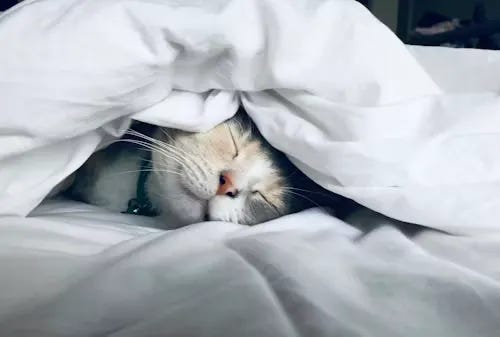What Happens When you Don't Sleep Enough
[This piece was co-created by Dt. Ishita and Vidhan. Vidhan broke down the stages and science of sleep, while Dr. Ishita unpacked the nutrition-sleep connection. We hope it helps you build a healthier relationship with sleep.]
I know all of you are smart enough to already understand how important sleep is. And for me, sleep is even more important than anything else. Without sleep, I can barely function. I was just in a sleep-deprived state, literally close to a zombie.
One time, a funny thing happened. I shared a post on Reddit about the importance of sleep like, when I wasn’t getting enough sleep, I started believing everything a political content creator said. Every video and fact he shared, I thought was 100% true. A lot of people laughed, and yeah, I got a bunch of hate comments too. Haha. I’m not trying to be political here but just imagine you blindly believe every single thing from one side. That’s what happens when you’re sleep-deprived. It was a joke, but it made me realize how messed up things can get without proper sleep.
So yeah, sleep is that important for healing, energy, muscle recovery, proper brain function, your mood (yes, those mood swings), and even your immune system. If you’re not sleeping well, it affects your body and your mind. Just for perspective we spend one-third of our lives sleeping.
Why do we sleep? Why is sleep important?
Let’s first talk about melatonin, a super important hormone in our body.
Melatonin is mainly produced by your pineal gland in the brain. It helps regulate your sleep-wake cycle and circadian rhythm.
The melatonin your body naturally produces is called endogenous melatonin, this is what makes you feel sleepy at night and helps you wake up after proper rest.
There’s also exogenous melatonin, which is the kind made in labs and sold as a supplement.
As the daylight fades, your hypothalamus signals the pineal gland to release melatonin. This process helps align your body’s internal clock with the outside environment. That’s why your body starts to wind down naturally at night.
The Stages of Sleep (Yup, Like Levels in a Game)
Sleep happens in stages and it’s literally like going through levels in a video game. There are 4 main stages: NREM 1, 2, 3 and then REM sleep.
NREM Stage 1 – Light Sleep
This is the lightest stage. It happens right after you fall asleep and lasts just a few minutes only about 5% of your total sleep. Your body starts to relax, brain activity slows down, and you may have small movements. It’s easy to wake someone up during this stage. If not disturbed, your brain smoothly moves into stage 2.
NREM Stage 2 – Light Sleep, But Deeper
This is still considered light sleep, but it’s deeper than stage 1. Here, brain waves slow down with short bursts of activity. Experts believe these bursts help your brain organize memories and process what happened during the day.
Stage 2 makes up 45% of your total sleep time. Your body becomes more relaxed your heart rate, breathing, and body temperature drop. Eye movement stops. This stage helps you stay asleep even if there are noises around you.
NREM Stage 3 – Deep Sleep
This is the deepest sleep stage and makes up around 25% of your total sleep. Your brain produces strong, slow waves called delta waves. Your body uses this time to heal, recover, and boost your immune system.
Stage 3 sleep is crucial. Without enough of it, you wake up feeling tired even after 8+ hours in bed. That’s why your body tries to pack most of this deep sleep into the first half of the night.
Waking up from stage 3 is hard. If someone wakes you up in this stage, you’ll probably feel groggy or disoriented (called “sleep inertia”).
Deep sleep also supports memory, creativity, and clear thinking. That’s why it’s not just about resting your body, it’s about restoring your brain too.
REM Sleep – The Dream Stage
This is stage 4, also called REM (Rapid Eye Movement) sleep. Here, brain activity rises again almost as if you’re awake. But your body becomes temporarily paralyzed (except for your eyes and the muscles that control breathing).
This is the stage where most dreams happen. REM is linked to memory, learning, and creativity. Your first REM cycle starts about 90 minutes after you fall asleep, and each REM stage gets longer as the night goes on eventually lasting up to an hour. In total, REM makes up 25% of your sleep.
Thanks for reading Every Step Matters ! Subscribe for free to receive new posts and support my work.
Nutrition and Sleep
When we think about good sleep, we often focus on bedtime routines, blackout curtains, or the perfect mattress. But there’s one piece many overlook: what you eat, when you eat, and how your diet affects your body’s complex sleep-wake rhythms.
Sleep is not just a passive state, it’s an active biological process influenced by neurotransmitters, hormones, and metabolic signals, many of which are directly shaped by your nutrient intake. Understanding this connection can turn your plate into a powerful sleep-supporting tool.
Nutrients That Support Sleep Physiology
Tryptophan (raw material for melatonin)
Tryptophan is an essential amino acid i.e. your body cannot make it, so it must come from food. It’s a precursor for serotonin, which is then converted to melatonin in the pineal gland, especially in response to darkness.
Key food sources:
Dairy: warm milk, curd, paneer. Traditional bedtime milk isn’t just comforting; it’s biochemically supportive.
Nuts & seeds: pumpkin seeds, sesame seeds, sunflower seeds, almonds, walnuts.
Eggs: particularly the yolk.
Poultry: turkey, chicken.
Oats, bananas: these provide carbs that help insulin clear competing amino acids from the blood, so more tryptophan can cross the blood-brain barrier effectively.
Magnesium (the natural relaxant)
Magnesium is a cofactor in more than 300 enzyme systems, including those that regulate neurotransmitters like GABA (gamma-aminobutyric acid). GABA has a calming effect on the brain, helping you wind down.
Low magnesium is linked to insomnia, restless legs, and light, fragmented sleep.
Good sources:
Dark leafy greens (spinach, moringa, amaranth)
Pumpkin seeds, chia seeds, flaxseeds
Legumes: chickpeas, lentils, beans
Nuts: almonds, cashews
Whole grains: millets, quinoa, brown rice
Avocados, bananas
Chronic stress depletes magnesium through increased urinary loss, so people under stress often need more magnesium to maintain calm sleep.
B Vitamins (regulators of circadian rhythm)
Vitamins B6, B12, and folate play key roles in synthesizing serotonin and melatonin.
B6 helps convert tryptophan to serotonin.
B12 helps keep your circadian rhythm aligned by influencing melatonin release.
Low stomach acid or long-term acid blockers can reduce B12 absorption. Older adults or people with acid-reducing medications may be at risk of low B12, which can subtly affect sleep-wake cycles.
Good sources:
Whole grains, legumes
Eggs, dairy, fish
Leafy greens
Nuts, seeds
Zinc (an underrated sleep ally)
Zinc works alongside B6 to convert tryptophan to serotonin. It’s also involved in regulating the nervous system and modulating sleep architecture.
Good sources:
Pumpkin seeds, sesame seeds
Legumes and lentils
Nuts, eggs, whole grains
Melatonin from food
Certain foods contain small amounts of melatonin directly, such as:
Tart cherries: one of the few foods shown to modestly increase melatonin levels.
Walnuts
Tomatoes
Grapes
Tart cherry juice in small studies has been shown to increase sleep duration and efficiency.
While the effect is mild, including these in your evening diet can have a gentle supportive effect.
Balanced Carbs: Stabilizing Blood Sugar for Deeper Sleep
A sudden dip in blood glucose can trigger cortisol (a stress hormone) release, waking you up at night. Eating too many refined carbs before bed can cause spikes and crashes.
A dinner with complex carbs, moderate protein, and healthy fats ensures a gradual, sustained release of glucose overnight.
Examples:
Brown rice, millets, quinoa
Sweet potatoes
Whole wheat roti with dal or lentils
Oatmeal with nuts and seeds
Poor sleep can worsen blood sugar control and increase cravings the next day, creating a vicious cycle of late-night snacking and sleep disruption.
Foods & Habits That Sabotage Sleep
Caffeine (the obvious and the hidden)
Caffeine blocks adenosine receptors in the brain. Adenosine is the neurotransmitter that builds up sleep pressure. Some people metabolize caffeine slower than others due to genetics (CYP1A2 gene variations).
Hidden sources:
Green and black tea
Chocolate (dark chocolate can contain significant caffeine)
Energy drinks, colas, some protein bars
Matcha and yerba mate
Tip: Stop caffeine at least 6–8 hours before bed. Sensitive people may need even longer.
Alcohol (the sleep disruptor)
Alcohol acts as a sedative but reduces REM sleep and increases sleep fragmentation. It also worsens snoring and sleep apnea by relaxing airway muscles.
Heavy, spicy, or fatty meals
High-fat meals slow gastric emptying, increasing the risk of acid reflux, especially if you lie down soon after eating. Spicy foods can raise body temperature and cause night sweats or heartburn.
High sugar or ultra-processed foods
Ultra-processed foods can trigger blood sugar spikes and inflammation, which can affect sleep hormone balance. Artificial additives and MSG (monosodium glutamate) in processed snacks may also disrupt sleep in sensitive individuals.
Too Much Salt
A very salty dinner can make you extra thirsty at night and increase nighttime bathroom visits. It may also raise blood pressure temporarily during sleep, fragmenting deep sleep stages. Restaurant meals, packaged foods, and ready-made sauces often pack in hidden salt.
Keep dinner seasoning moderate and flavor your meals with fresh herbs, spices, and a squeeze of lemon instead.
The Gut Microbiome: The New Frontier in Sleep Science
Emerging studies show your gut microbes produce and modulate neurotransmitters like serotonin, GABA, and dopamine, all crucial for sleep and mood regulation.
A diverse, fiber-rich diet with whole grains, vegetables, legumes, fermented foods (curd, kefir, homemade pickles, kanji, idli-dosa batter) can improve gut health, which indirectly supports sleep quality.
Probiotic and prebiotic foods:
Yoghurt with live cultures
Kefir
Fermented vegetables
Whole plant fibers (onions, garlic, asparagus, oats)
These gut bacteria produce short-chain fatty acids (SCFAs) like butyrate, which may help reduce inflammation and support sleep quality.
Herbal & Functional Sleep Helpers
Certain herbs and natural remedies have gentle sedative properties that can support better sleep when used wisely. For centuries, chamomile tea has been known to calm the mind thanks to apigenin, which binds to calming GABA receptors. Other gentle helpers include passionflower tea, valerian root (short-term use), or ashwagandha, which may lower stress hormones like cortisol.
A warm cup of golden milk with turmeric, a pinch of nutmeg, and black pepper can also be a soothing bedtime drink. Nutmeg contains mild sedative compounds, just a small pinch is enough.
Always check for interactions if you’re on medication, and use herbal sleep aids mindfully rather than daily crutches.
Meal Timing: The Circadian Nutrition Angle
Chrononutrition is a growing field showing that when you eat is almost as important as what you eat:
Eating late at night disrupts your circadian rhythm.
Late-night high-calorie meals can misalign your internal clock.
Regular meal times support better melatonin release at night
Your first meal timing acts like a time cue (‘zeitgeber’) for your circadian clock, just like morning sunlight. Skipping breakfast or erratic meal timing can confuse melatonin rhythms at night.
Tip:
Finish dinner 2–3 hours before bed.
If you need a snack, keep it light and sleep-supportive (warm milk, banana, handful of nuts).
Weight & Sleep: A Two-Way Street
Being overweight is linked to sleep apnea, poor sleep quality, and daytime sleepiness. On the flip side, sleep deprivation affects hunger hormones (ghrelin and leptin), often leading to overeating the next day. Nutritional balance helps break this vicious cycle.
Sleep deprivation
Sleep deprivation doesn’t just make you tired, it silently disrupts your entire system. When you consistently miss out on sleep, your brain struggles to focus, your memory weakens, and emotional regulation takes a hit. Hormones like cortisol (the stress hormone) spike, while crucial ones like melatonin and growth hormone drop, messing with everything from mood to metabolism. Over time, this imbalance weakens your immune system, increases your risk of chronic diseases like heart issues and diabetes, and even accelerates aging
Natural Tips to Improve Your Sleep
Stick to a schedule :- Try to sleep and wake up at the same time every day. I get it—life is busy. But if you care about your energy and focus, build a sleep routine.
Don’t follow generic charts :- Some people function on 4–5 hours, others need 8–9. Learn what works for your body.
Avoid bright lights and screens :- at least an hour before sleep. The light messes with melatonin and delays sleep.
Avoid alcohol or heavy food before bed :- It messes with your sleep quality.
Don’t overuse sleeping pills :- even over-thebcounter ones. They may work short-term but damage your natural sleep cycle long-term.
Stay active during the day.:- Even a small walk helps.
Cut off caffeine 6–8 hours before bed :- Caffeine hides in tea, energy drinks, chocolate so check your intake.
Use a sleep mask :- if your room isn’t dark. Darkness helps your body produce melatonin better.
Get sunlight early in the day :- It resets your body clock and helps you sleep better at night.
Journaling :- Writing down your thoughts also help you to clear you mind and help you to sleep better.
If you liked this piece, and you have anything in your mind. share it in the comments. We’ll talk about it together and figure things out.
References
Bonus:
If you want to learn more about sleep in detail, check out this Huberman YouTube playlist on sleep.








This was indeed helpful😇❤️
Incredibly written. ✨🎗️As someone who really struggle with sleep this was really helpful, got a lot new information . 🫶🏻